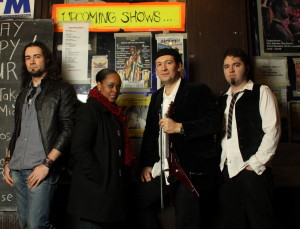Prog Talk: Joe Deninzon & Stratospheerius
Posted 4/25/2013
With a musical background that encompasses classical, jazz, rock, world and all points in between, violinist-mandolinist-vocalist-bandleader Joe Deninzon is a whirling dervish of vibrant creativity. He is one of those folks who seem to have a limitless supply of intriguing ideas. Deninzon is the embodiment of a true progressive artist, with jazz at his sonic core.
“I was a jazz major in school, and that jazz influence has always been infused in our music,” he said.
Deninzon was born in St. Petersburg, Russia, and is the son of a concert violinist father and a concert pianist mother. He grew up and was raised in Cleveland, and studied classical and jazz violin at Indiana University. After relocating to New York City in 1998, Deninzon recorded his first venture into the jazz-fusion milieu, Electric/Blue. Its release was concurrent with the budding string player’s burgeoning career as a freelance studio musician and sideman.
He was also studying at the Manhattan School of Music and teaching at The New School for Jazz and Contemporary Music. It was there that he met and began a musical partnership with guitarist Alex Skolnick, known for his work in the metal genre. The two of them pooled their love of electric Miles Davis, Weather Report, Mahavishnu Orchestra and the like into an exciting new ensemble called Stratospheerius. This collaboration resulted in the 2002 CD The Adventures Of Stratospheerius. The 12-track album consisted mostly of Deninzon’s compositions along with interpretations of songs by Wayne Shorter, Vince Guaraldi and Stevie Wonder.
Stratospheerius established itself as a high-energy performance entity, with extended jams, sophisticated improvisation and intricate violin/guitar interplay, as evidenced on the 2004 concert disc Live Wires. The album was a turning point for Deninzon and company in numerous ways. Jake Ezra replaced Skolnick on guitar, and it was the debut for drummer Lucianna Padmore, a fellow New School alum. They also trimmed the outfit from a sextet to a lean-and-mean foursome, with Ron Baron on bass. In 2007 the album Headspace took the band in a slightly different direction as more overt funk and jazz styles were laced with increasing melodic and progressive rock overtones. More personnel changes transpired as bassist Bob Bowen and guitarist Mack Price joined Padmore for the expansion of their sound.
Around this juncture Deninzon took a break from the fusion world, teaming with bassist Bowen and guitarist Steve Benson in the acoustic Joe Deninzon Trio, which recorded the 2010 jazz albumExuberance. It was at this point where the versatile violinist took a step back to his musical beginnings and cast all of his improvisational influences together in a fresh light.
“What’s really fun for us is to open up the songs live and take them in all directions,” Deninzon explained. “For that to happen, you’ve gotta have an improvisational jazz mentality and tap into a certain head space. We all have a jazz background and we bring that to the table.”
Following Straospheerius guitarist Price’s departure and Bowen’s tragic death in a biking accident, Deninzon recruited French guitarist Aurelien Budynek and bassist Jamie Bishop in 2008. This has been the group’s most consistent and enduring lineup thus far, documented on the 2012 CD The Next World.
“On my first [album] we did a cover of Thelonious Monk’s ‘Well, You Needn’t,’” Deninzon said. “On The Adventures Of Stratospheerius, we covered Wayne Shorter’s ‘Nefertiti.’ Our latest is a more focused and song-oriented album. It’s heavier and more rock-oriented but there are still a lot of jazz influences there, too.”
The all-original excursion contains a lot of jazz-influenced music, such as the dynamic and atmospheric disc opener “Release,” while the instrumental “Fleshbot” has a lot of fire à la violinists Jean-Luc Ponty and Didier Lockwood. “Missing Link” matches odd time signatures with strong vocal hooks, and “Ballad For Ding Bang” is a sweet dedication to Deninzon’s son Max that features smooth chord changes and delicate accents by Padmore.
“I’ve always admired artists who are spontaneous and don’t just rehash their recorded material onstage,” Deninzon said. “I always like to keep the band on their toes and keep me from being bored playing the same material. We’ll change what we play and how we play it. Zappa was notorious for doing that kind of thing. Weather Report did that. All the great jazz groups did that. I let the music dictate where I’m gonna go—sort of like a Ouija board where you tap into that spirit and it leads you where it wants to.”
—Eric Harabadian

